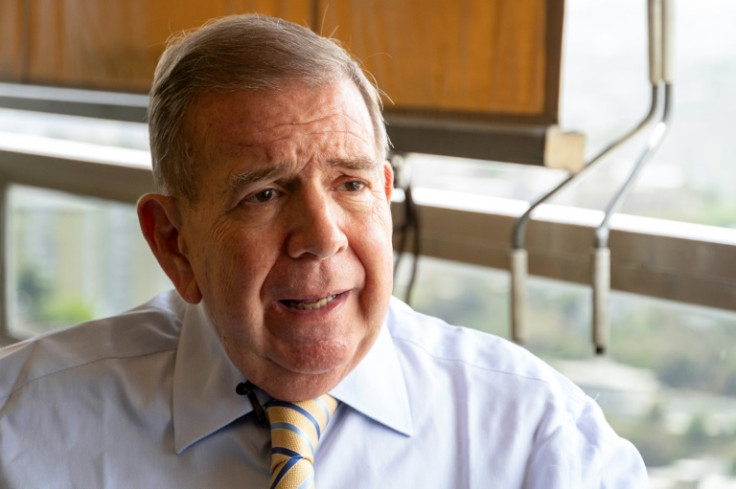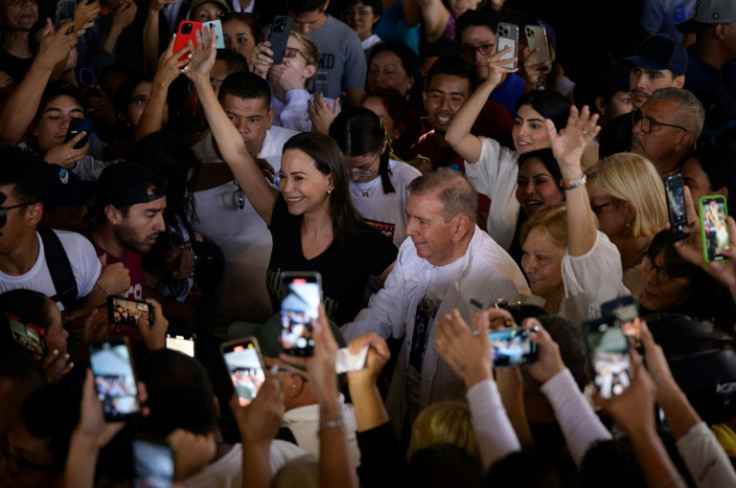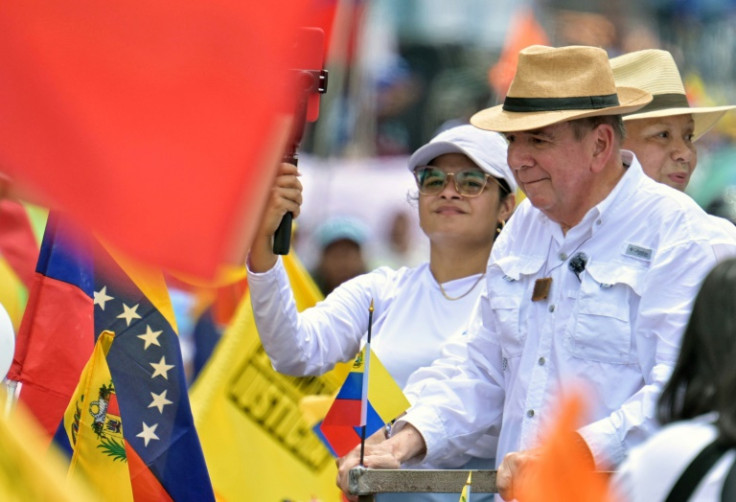Venezuela's Opposition Candidate Gonzalez Urrutia: From Placeholder To Pointman

Edmundo Gonzalez Urrutia, a soft-spoken grandfather who eschews the spotlight, is the Venezuelan opposition's hope for unseating strongman Nicolas Maduro in July 28 presidential elections.
Miles ahead in opinion polls in a country beset by economic hardship and worsening political repression, according to rights groups, the 74-year-old accepted the role reluctantly.
There was little choice.
Opposition leader Maria Corina Machado, who polls as Venezuela's most popular politician by far, was disqualified from the race by courts loyal to Maduro, who is seeking a third term.
The hands-down winner of an opposition primary last year, she is accused of corruption -- charges widely dismissed as bogus.
Replacement candidates, too, were barred or pulled out, and in April, Gonzalez Urrutia accepted a last-minute inscription as a placeholder candidate for the Democratic Unity Platform (PUD) opposition coalition.
As Machado's hopes to return to the ticket were thwarted, he went from being a stand-in to the actual opposition candidate.
"I never, never, never imagined I would be in this position, but that is secondary to the challenge ahead," the political analyst and former ambassador to Algeria and Argentina told AFP shortly after his nomination.
"This is my contribution to the democratic cause... This is my contribution to unity, to the struggle for a democratic transition."
Unassuming Gonzalez Urrutia does not have the sparkle of 56-year-old Machado, who is received like a rock star wherever she travels to campaign for him.
Nor does he enjoy the state-sponsored ubiquity of Maduro, who spreads his populist message from public TV, graffiti on building facades, T-shirts, even dolls in his likeness.
For Jose Toro Hardy, an economist and political analyst with the Andres Bello Catholic University in Caracas, Gonzalez Urrutia is the antithesis of Maduro "and the traditional politician."
The opposition candidate is also different to the stocky but sprightly Maduro in other ways: he walks slowly, expresses himself reservedly and has a slight hand tremor.
Public speaking is not his forte, and Gonzalez Urrutia tends to stick to prepared scripts delivered in a monotone voice.
He much prefers that the cameras and microphones point at the charismatic Machado, who has traveled the country to beat the drum for her replacement -- by car as she is banned from flying.
Described by those who know him as "decent," "intelligent" and a "democrat," Gonzalez Urrutia is credited with building the opposition coalition into what it is today. He has worked to this end quietly, behind the scenes, for the last 16 years.
Ramon Guillermo Aveledo, a former secretary of the coalition group, has described the reluctant leader as "a servant of the republic."
Gonzalez Urrutia insists he has no personal aspirations and still refers to Machado as "the leader of the opposition."
One of his life's pleasures, he has said, is to chat from his balcony with two of his four grandchildren who live in a neighboring apartment in Caracas.
He also loves feeding the exotic birds that visit him there.
Then, overnight, he was thrust into the chaos of a campaign that has seen opponents to Maduro's government sidelined, arrested, even jailed.
A small sacrifice for a greater good, he said in the April interview: "We must all fight for Venezuela's recovery and transition. That is what's fundamental."
Born and raised in La Victoria, a small city some 110 kilometers (68 miles) from Caracas, Gonzalez Urrutia studied international relations at the Central University of Venezuela in the capital.
He joined the foreign ministry and was posted to Belgium and Washington before becoming ambassador.
He has written several books on Venezuela and is an avid reader of political texts. Samuel P Huntington's "Clash of Civilizations" and Henry Kissinger's "On China" are among the titles on his bookshelf at home.
On the campaign, Gonzalez Urrutia has stuck to a moderate political discourse, making frequent calls for reconciliation and even alluding to possible amnesties in case of a political transition.
As president, he told AFP, he would work to "bring Venezuelans together (and for) the return of political exiles" followed by "the recovery of the economy and of democracy."
But he conceded the road there may be bumpy.
The opposition, the candidate said, was "prepared for all scenarios" in the July 28 vote against the backdrop of a regime that views challengers "not as adversaries, but enemies."


© Copyright AFP 2025. All rights reserved.





















